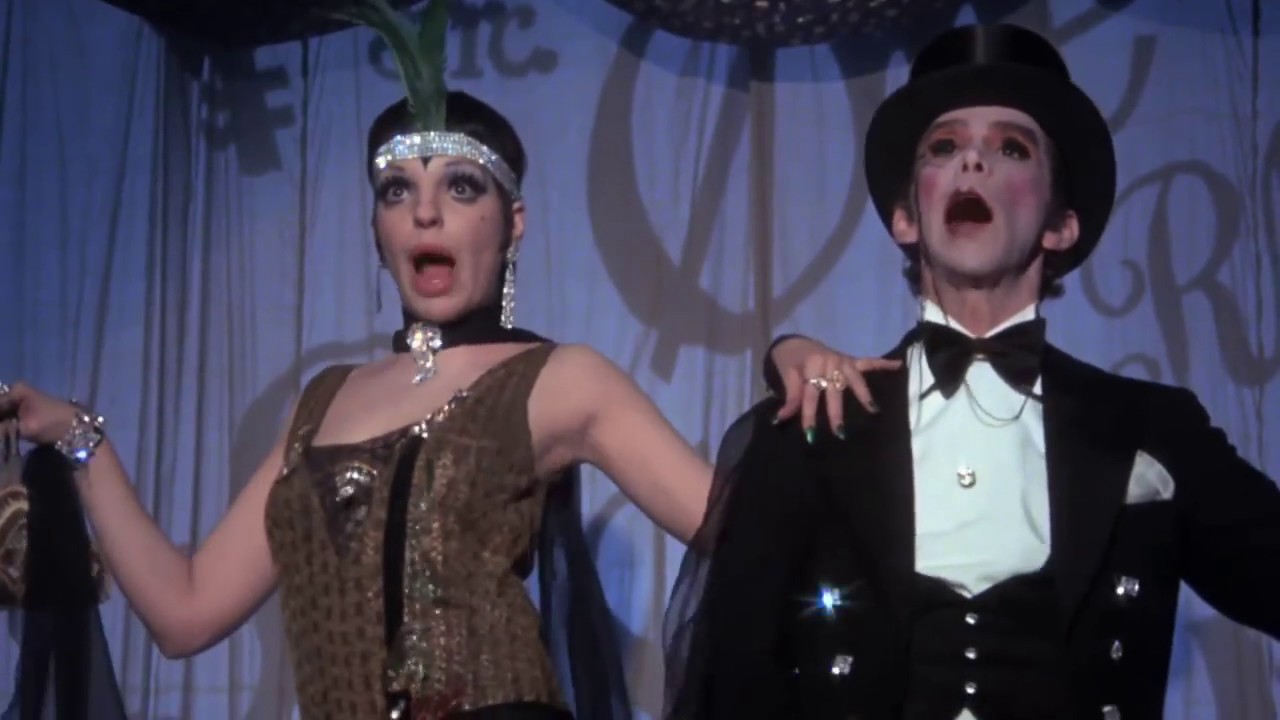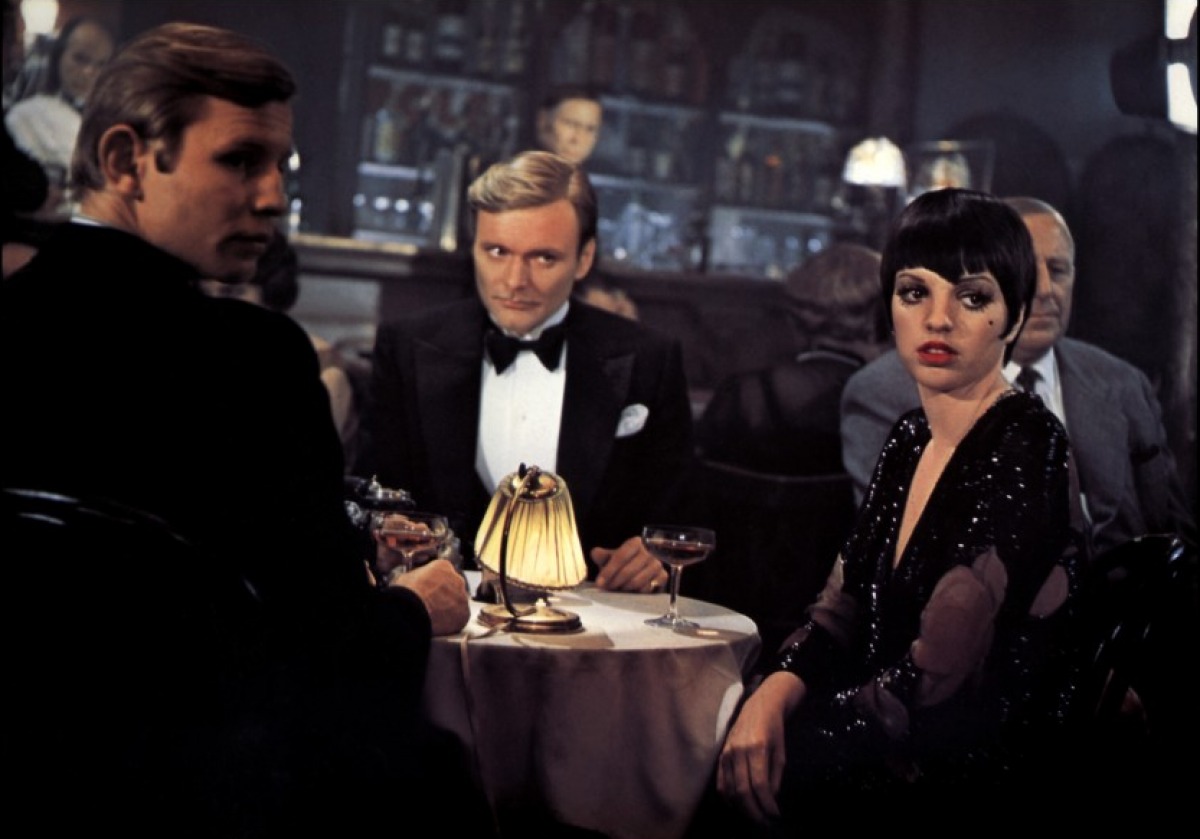In this new series, members of Team Film Experience watch and share their reactions to classic films they’ve never seen.

By Ben Miller
Cabaret is Bob Fosse’s “musical” into the world of bohemian performer Sally Bowles and uptight Brit Brian Roberts. Both try to navigate the world of love along with the struggle to reach a level of extravagance, all the while experiencing the adapting political climate of 1930’s Berlin.
Shamefully, I had never seen it.
My grandmother hooked me on to the Oscars as a young child. I always had an analytic thirst for knowledge, so she bought me an almanac. I would flip to the Oscar section and each year would summarize the Best Picture, Director, Lead and Supporting acting categories. I liked looking for patterns, so I noticed things like the big four sweeps of 1934, 1975 and 1991. I also liked looking for a few films to dominate the six categories. 1972 stood out because I knew about The Godfather, but noticed it lost Best Director, despite winning Best Picture. My knowledge of Cabaret was limited to the fact that it beat The Godfather for Best Director.
I grew up in the south in the 90s with a conservative family. If you look at the films of 1972, the only one I saw before the age of 16 was The Poseidon Adventure. It made sense, it was a disaster spectacle and one of those movies you don’t have much of a problem showing your kids. As I grew older, I had the opportunity to branch out in my film knowledge, but was also held back by what I had access to. The other big film from 1972, The Godfather, was a staple of cable television and the go-to as the “masterpiece” accepted by the masses. Cable is where I watched most of my movies and I didn’t have my own TV until I was in college, so I was limited by whatever anyone else wanted to watch. Not only did my family not want to watch Cabaret, it never had a run on cable TV. If I wanted to watch it, I would have to seek it out. Cabaret wasn’t one of those films I had ever attempted to seek out.

The first thing that stood out was the musical interludes. I always appreciate when songs can be woven into a film narrative naturally instead of groups of people breaking into spontaneous song and dance. With one notable exception, all the songs are performed on-stage at the Kit Kat Klub and all dances were rehearsed and planned outside of the audience purview. Joel Grey immediately pops in his Oscar-winning portrayal as the Master of Ceremonies, starting off with the showstopping “Willkommen” on the main stage.
The music itself is not as grandiose as I was expecting. I was thinking along the lines of Chicago with pizazz and bright lights, but Cabaret is under-lit and moody, despite the lighter, comical touch of the musical numbers. These songs are not for Broadway stages or theaters, but for a lower, seedier crowd and the production does the best they can with what they have. The dancers aren’t perfect and the songs aren’t flawless, but they are pretty good for 1930s Berlin. These are the minor leagues, filled with minor league equipment and minor league players.
We are quickly introduced to British university student Brian (Michael York) knocking on the door of Sally (Liza Minnelli, in her Oscar-winning role) asking about a room to rent. Just like Grey, Minnelli is the immediate draw of the camera’s attention, with her comically large eyes, distractingly robust eyelashes, pixie haircut and razor-sharp features. Her first words exude confidence and in less than three minutes after our introduction, we have a general understanding of her personality, attitudes and daily routine. Sally wants to be a star, and she just knows she will be one as she scraps her way to the top.
Minnelli blows everyone off the screen and crafts an indelible portrait of bohemian life. Initially, I wanted to fault Cabaret for leaning into the cliché of free-spirit-meets-uptight-square, until I realized Cabaret may have invented the cliché.

Brian shows up offering her a playful distraction on her road to fame, but his characterization leaves plenty to be desired. If there was one thing about the film I really didn’t like, it would be the character of Brian, or more specifically, York’s portrayal. If York didn’t look the way he did in 1972, I would see no redeemable qualities to him. He is boring, distant and tonally inconsistent. The only reason I see Sally sleeping with him is her seemingly endless sexual appetite, and most importantly, his proximity.
Playboy Maximillian (Helmut Griem) enters the picture and inserts himself in the lives of Sally and Brian, showing them both a life of luxury they could only dream of. All the while, Berlin is evolving politically as the Nazi party slowly rises to power and the atmosphere begins to change. 47 years after its initial release, Cabaret’s window into the rise of the Nazi party feels eerie. The Nazi tide finally overwhelms the country when Brian and Max visit a local biergarten and a Hitler Youth begins singing a Nazi anthem “Tomorrow Belongs to Me”, the only song performed outside the club. Slowly but surely, the majority of the crowd joins in as the singing doesn’t stop, even after Brian and Max leave. It gets my vote as one of the creepiest film scenes of the decade.
Nazism aside, I can imagine a measure of controversy around the topics the film handles. These include, but are not limited to: bisexuality, abortion, STDs, gold-digging, and unrepentant promiscuity. Fosse doesn’t beat around the bush with these topics either. He dives in head first and shoves these features right in your face. My biggest compliment I can give Fosse is his absolute lack of desire to give the audience exactly what they want.
The rest of the supporting cast does well, especially Marisa Berenson as a rich Jew who enters into the bubble of Brian and Sally. She has a standout monologue about falling in love with someone you have no business falling in love with at the film’s midpoint.
![]() The film has a very 70s aesthetic and the craftspeople have the awards to show for it. In addition to the Oscars for Fosse, Grey and Minnelli, the film took home awards for Cinematography, Editing, Art Direction, Sound and Film Score (Adaptation). If you would pick out a snub, it would be for Best Costume Design. Sally’s black dress/bowler hat combo might be the most iconic costume in musical history, and it couldn’t even muster a nomination.
The film has a very 70s aesthetic and the craftspeople have the awards to show for it. In addition to the Oscars for Fosse, Grey and Minnelli, the film took home awards for Cinematography, Editing, Art Direction, Sound and Film Score (Adaptation). If you would pick out a snub, it would be for Best Costume Design. Sally’s black dress/bowler hat combo might be the most iconic costume in musical history, and it couldn’t even muster a nomination.
Frankly, I’m glad I waited all these years to see it. In the last few months, 22 people were gunned down in my home state for being in the sights of a fanatic right-winger. At the opening of the film, patrons of the Kit Kat Klub kick out a Nazi. Later, they are seen as a necessary evil, before eventually ascending as the ruling party. The film’s final shot shows the club dominated by men with swastika arm bands. The slow evolution of the Nazi party is seemingly mirrored in today’s society with the rise of the Alt Right, though luckily still in the early stages.
The film seems to take three political viewpoints. Max believes that his country will eventually wise up be able to take the country back. Brian is filled with anger and common sense, but eventually has to flee when that doesn’t prevail. Sally takes a laissez faire attitude and keeps looking out for number one. All three are proven foolish at one point or another.
Overall, the film is an exceptional achievement, and I have no issue with Fosse beating Francis Ford Coppola for the Best Director Oscar. I’m glad I finally got around to this film as I can now argue The Godfather is not the Best Picture of 1972.
Other episodes of this series:
M (31) by Mark Brinkerhoff
Rear Window (54) by Chris Feil
Z (69) by Mark Brinkherhoff
Enter the Dragon (73) by Cláudio Alves
The Parallax View / Three Days of the Condor (74/75) by Lynn Lee
Farewell, My Concubine (93) by Tim Brayton
While You Were Sleeping (95) by Cláudio Alves
Memories of Murder/The Host (03/06) by Cláudio Alves